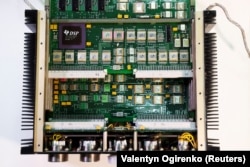In the spring of 2024, the Belarusian government placed the Manalit radio components plant in Vitsebsk on its Republican Honor Board for "outstanding economic results." It was the second time in a row the plant had received this recognition.
The recognition of Manalit, a Russian-owned manufacturer based in Belarus, came as the plant become a critical supplier of high-reliability electronic components for missiles, radars, and aircraft used by Russia in its war against Ukraine.
Within the first two years of Russia's full-scale aggression against Ukraine, which began in February 2022, Manalit's annual profits increased nearly sixfold, driven almost entirely by military exports to Russia.
Manalit's history mirrors that of many in Belarus's heavy industry. Founded in the Soviet era as a major producer of ceramic capacitors, the plant fell into crisis in the 1990s as demand collapsed. By 2009, it was near complete liquidation.
In 2011, salvation and transformation came from its former competitor: the Kulon plant in Russia's second-largest city, St. Petersburg. Russian investors acquired a 51 percent controlling stake, effectively turning Manalit into an offshore production base for Russia's defense industry.
Capacitors Built for War
Manalit specializes in multilayer ceramic capacitors of exceptional durability, certified for use in military and space applications.
"Ninety-seven percent of our output serves Russia's defense industry, " Manalit's director, Alyaksandr Shumakher, was cited by BelTA state news agency as saying in November 2020.
In 2024, Vitsebsk Regional Executive Committee Chairman Alyaksandr Subotsin noted that the plant was "operating systematically" and had shown results over the previous two years that "could not fail to satisfy."
Capacitors like Manalit's K10-84 series are not intended for consumer electronics. Instead, they are found in missile guidance systems, radar arrays, electronic warfare modules, and nuclear control systems, where failure can mean the loss of a mission or weapon.
A Loophole In Sanctions
Western sanctions imposed on Russia in 2014 after the annexation of Ukraine's Crimea cut off direct access to advanced Western electronics for military use.
But Belarus was not subject to the same restrictions until 2022. For nearly eight years, Manalit exploited this gap, importing equipment and materials from Europe and the United States, then shipping finished components to Russia to replace banned Western parts.
Even today, despite EU and US sanctions, Manalit is allowed to purchase Slovenian KEKO production lines, equip them with Japanese Pro-face control panels (owned by France's Schneider Electric), and continue sourcing American precious-metal powders for capacitor production.
Evidence In The Debris Of War
According to a specialist from the Ukrainian Defense Ministry's Main Intelligence Directorate (HUR), Manalit-made K10-84 capacitors have been found in Russia's Iskander ballistic missiles, Kalibr cruise missiles, Kh-101 air-launched cruise missiles, S-200 and S-300 air-defense missiles, as well as Zoopark counter-battery radar systems.
"The air-pressure system in Kh-101 missiles, all the capacitors, and 80 percent of the microchips are Belarusian-made. As for the control blocks in the 2024-model Iskanders, almost every capacitor in them is from Manalit," the specialist told RFE/RL.
Links To The Kremlin
Manalit's exports to Russia are funneled through a single dealer: Spetselektronkomplekt (SpecEk), a major supplier to Russia's Defense Ministry.
Customs data obtained by RFE/RL and the Belarusian Investigative Center show that from October 2022 to March 2025, Manalit shipped $43 million worth of goods to SpecEk, 96 percent of it ceramic capacitors.
SpecEk is registered in Russia's closed registry of defense contractors, which lists suppliers to the following partners in Russia:
Rostec: An umbrella for 350 defense enterprises, producing 40 percent of Russia's state arms orders.
Almaz-Antey: Themaker of the S-300, S-400, Buk, and Tor missile systems.
KRET: Electronic warfare systems
UAC: Su, MiG, and Tupolev aircraft
Tactical Missiles Corporation: Precision missiles, including the Kh-101
UralVagonZavod: Main battle tank production
Russian Helicopters: Mi-8, Ka-52, Mi-35 gunships
War Profits, Sanctions
Before the full-scale war began in 2022, Manalit's annual profits were around $1.4 million. By 2024, net profit was up to $6.2 million. The company has seen growth over the past five years of over 460 percent.
It has achieved record-breaking profits during the bloodiest conflict in Europe since World War II.
In May 2023, Ukraine sanctioned Manalit for "directly facilitating Russian military aggression." Meanwhile, neither the EU nor the United States has followed suit, leaving the company with open access to Western suppliers.
This has effectively made Manalit a "sanctions gateway," a Belarusian legal entity delivering Western technology to Russia's military.
Since falling under Russian control in 2011, Manalit has been modernized with Western equipment, maintained open access to European and US raw materials, and secured Russian military certification. It also supplied capacitors found in missiles that have struck multiple Ukrainian cities.
As Western governments debate new sanctions, the capacitors made in a quiet Belarusian factory continue their journey from Vitsebsk's assembly lines to Russia's missile plants, and finally, to the skies over Ukraine.














